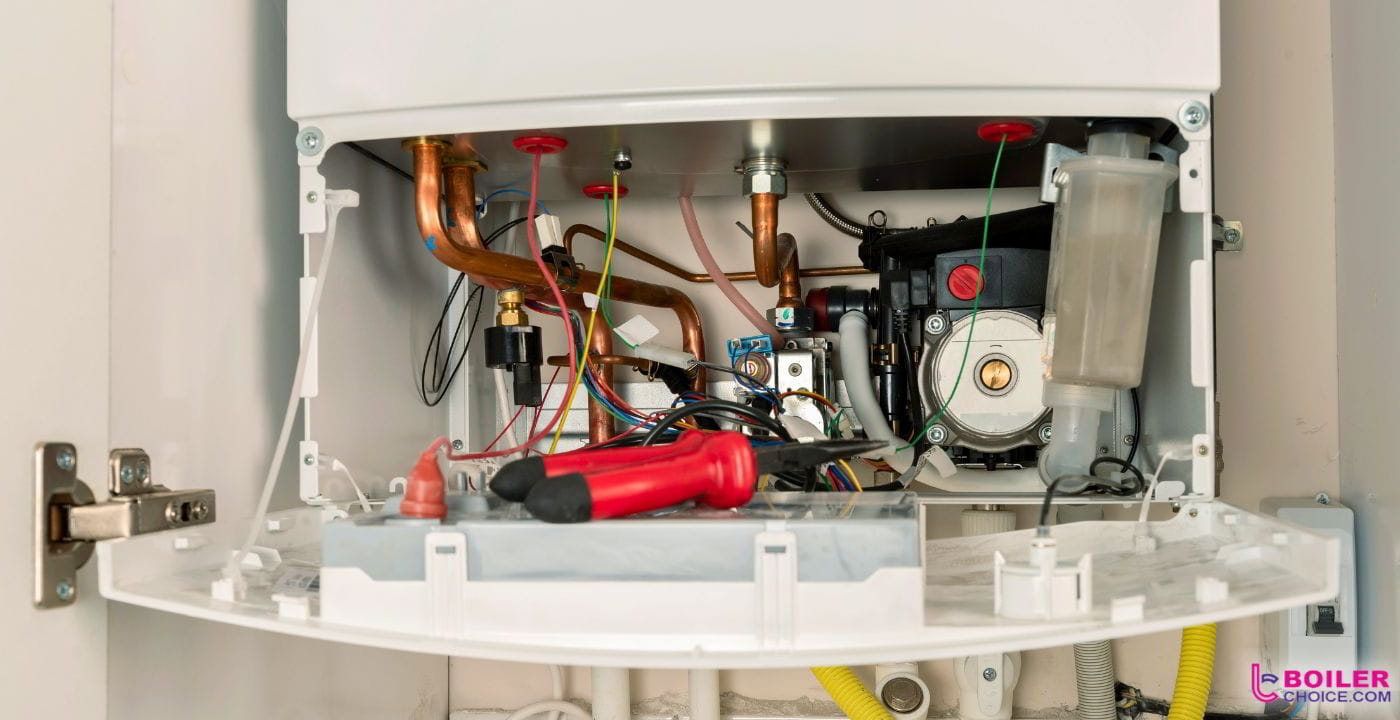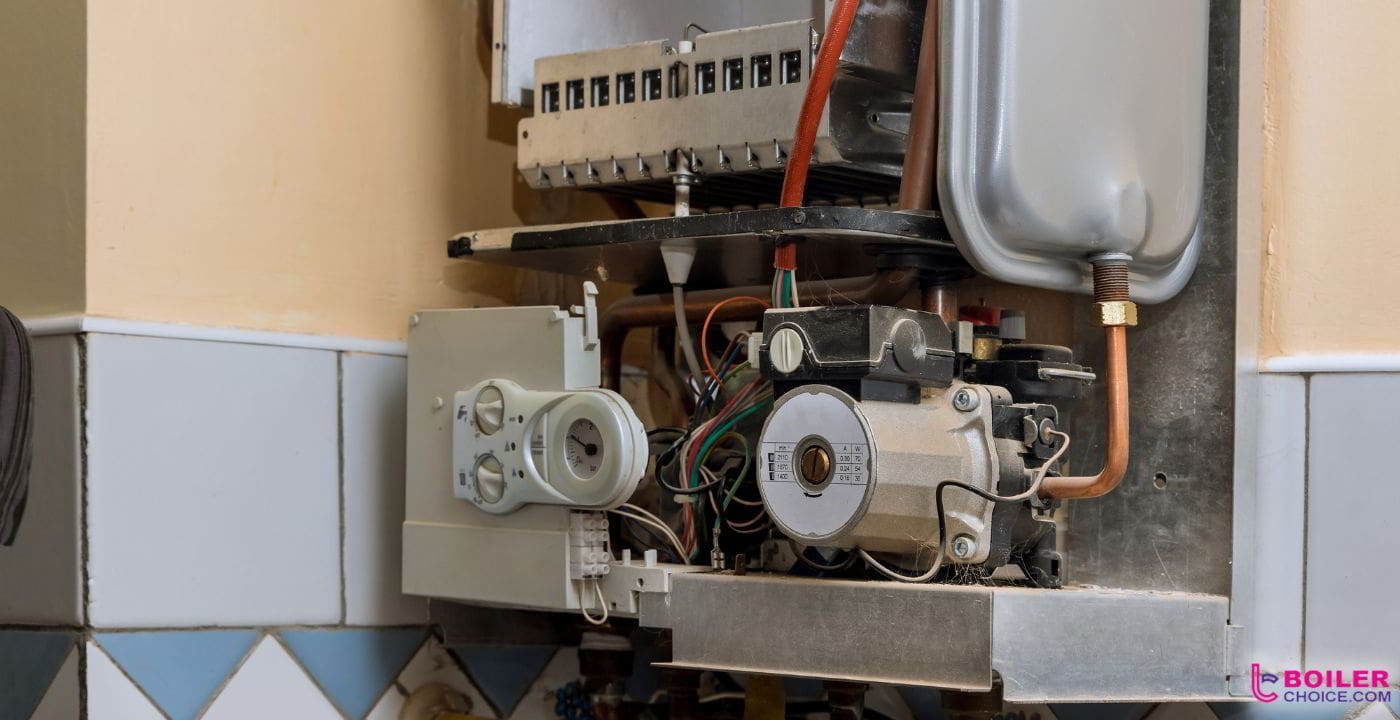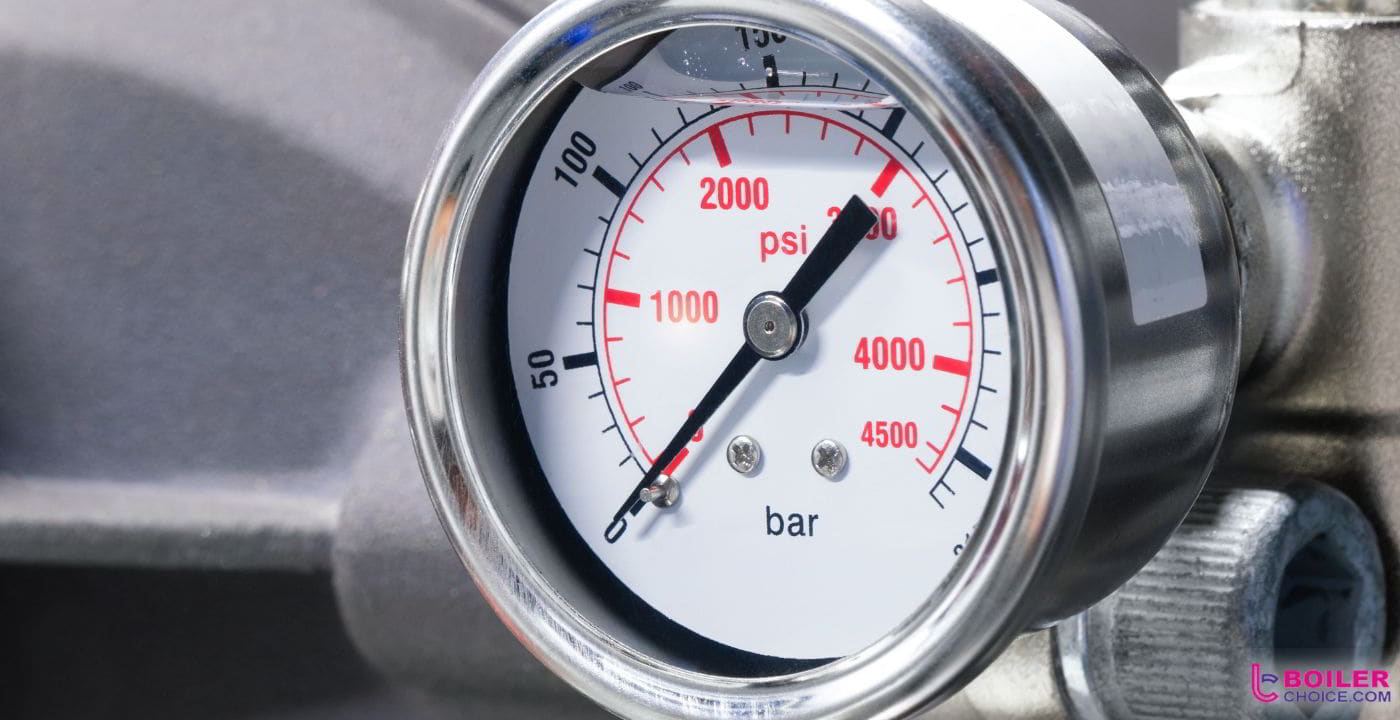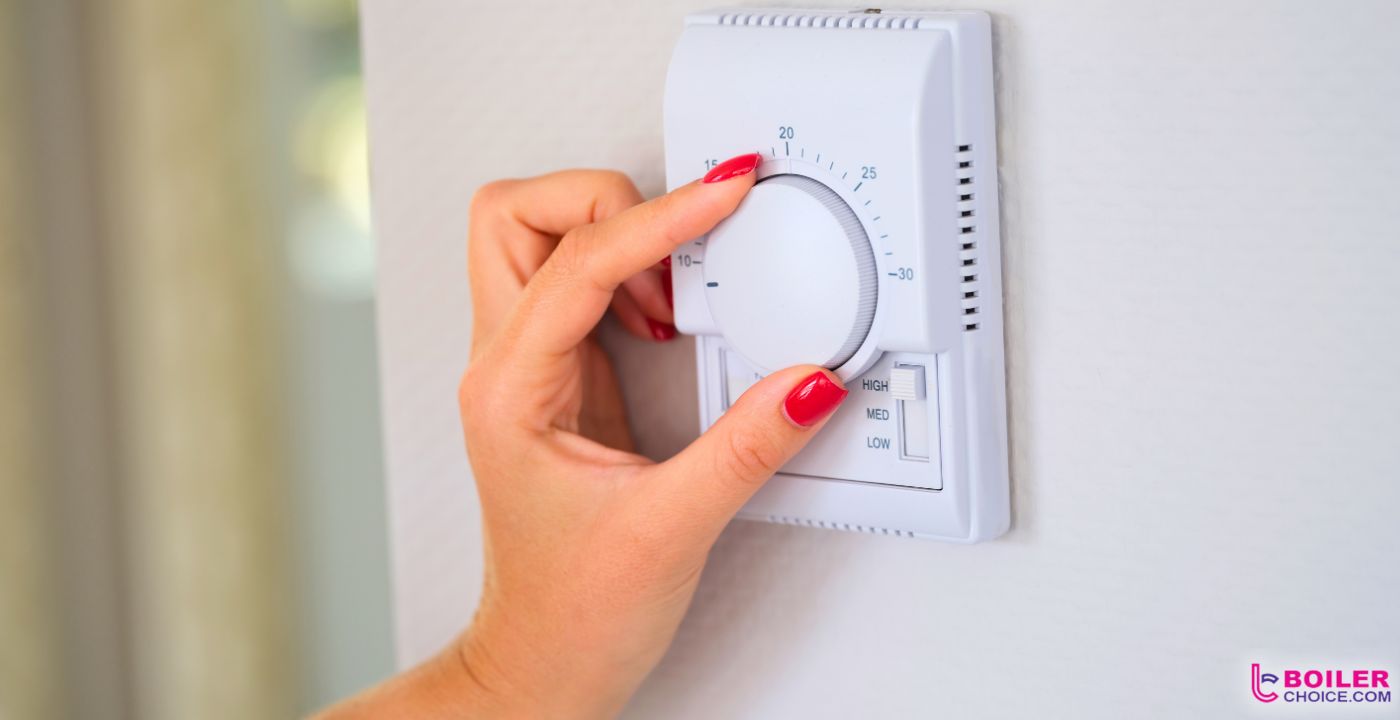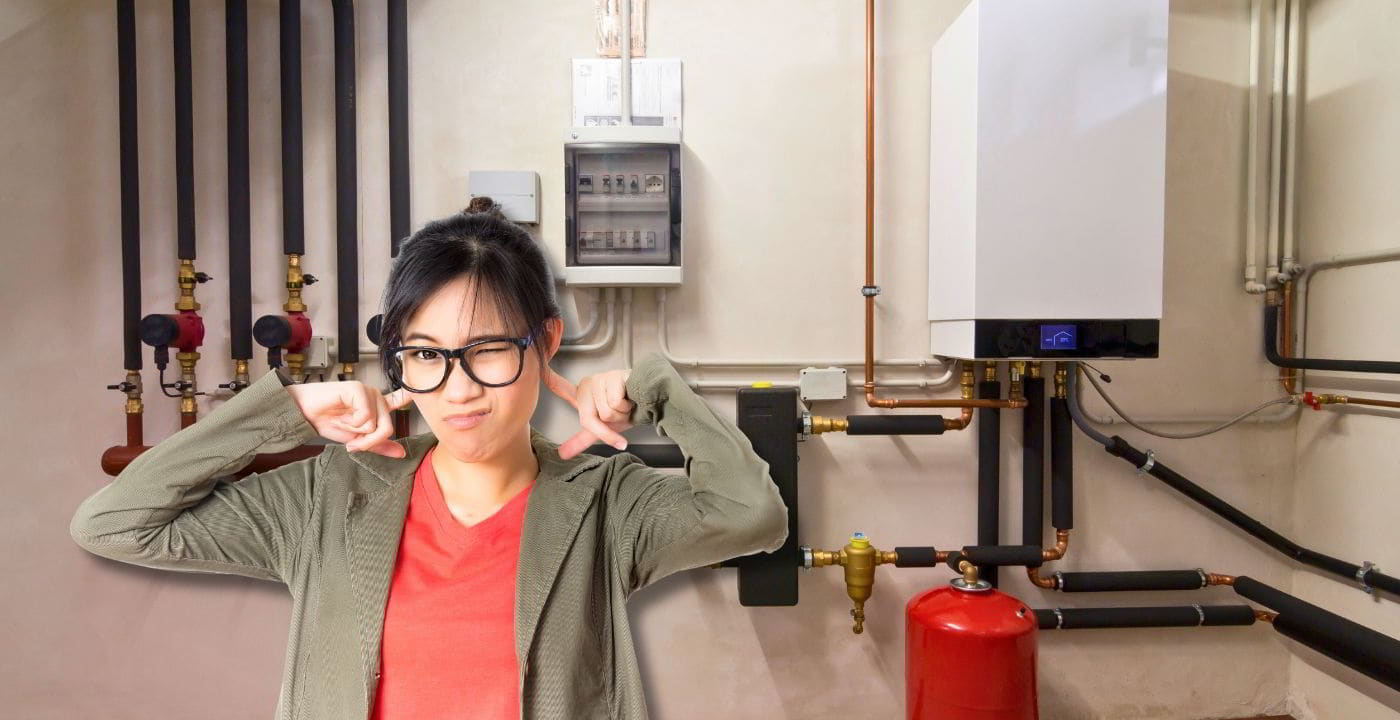
Key Takeaways
- Kettling is a common problem that can be the cause of a high-pitched whistling or rumbling noise in a boiler. These can be solved with system flushes or by descaling.
- Trapped air (aka airlock), usually signalled by a gurgling sound, can be easily solved in most cases by bleeding your radiators.
- Loud clunking or Banging sounds are often serious and should be addressed immediately.
Regular cleaning and maintenance are vital to prolonging the life of your boiler. Always ensure you have it serviced annually and that you bleed your radiators at least every 6-12 months.
Boilers can communicate their distress through various sounds, and each noise could point to a specific problem.
It’s crucial to interpret these audible cues correctly to maintain your boiler’s health and efficiency.
Causes of Combi Boiler Water Going Cold
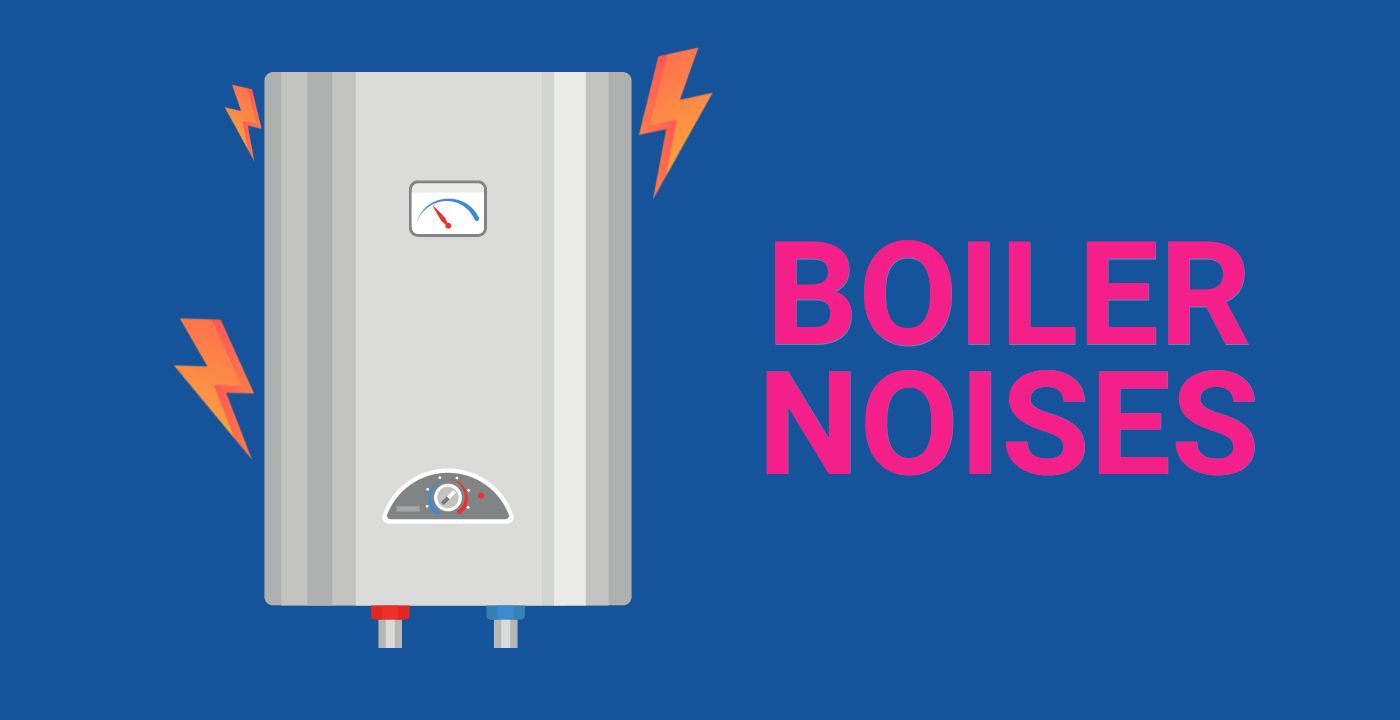
If your boiler is making a:
Whistling Noise
A whistling noise, often compared to a tea kettle, usually signifies ‘kettling’.
This condition occurs when limescale accumulates, restricting water flow and causing it to overheat and steam.
To fix this, you may need to descale the boiler or adjust the thermostat.
A professional can provide a more permanent solution by inspecting for limescale and recommending a suitable treatment, such as a chemical flush.
Humming Noise
The humming sound from a boiler is often due to high pressure or a pump operating at the wrong speed.
To correct this, you can try reducing the boiler pressure and checking the pump settings.
However, if the issue persists, it’s wise to seek the expertise of a certified engineer.
Gurgling Noise
Gurgling usually indicates air trapped in the system.
This can often be resolved by bleeding the radiators. If the gurgling continues, it might be a blockage or a pump issue, for which you may need to consult a professional.
Buzzing or Whining Noise
A persistent buzzing or whining emanating from your boiler often signals that the pump bearings are deteriorating.
This acoustic alert indicates that the boiler requires prompt and professional servicing to prevent further damage and ensure safe operation.
Grinding Noise
Grinding noises could point to a fault within the boiler’s moving components, such as the bearings or the heat exchanger.
This type of noise should be checked by a professional immediately to prevent further damage.
Whirring Noise
When your combi boiler emits a whirring sound, it’s likely pointing to an issue with either the fan or the pump. This could be due to the fan operating at a higher-than-normal speed or the pump moving water through the system too swiftly.
Such conditions can produce a distinct whirring noise, suggesting that it’s time to consult with a Gas Safe registered engineer who can properly diagnose and remedy the problem.
Ticking Noise
A ticking sound coming from your boiler can usually be attributed to the normal thermal expansion and contraction as the unit cycles through heating and cooling.
This rhythmic ticking is generally expected. However, if you notice the ticking becoming unusually loud or incessant, this may signal a deeper issue at play.
In such instances, enlisting the expertise of a Gas Safe registered engineer is prudent to assess and address any potential problems.
High-Pitched Noise (Usually When Hot Water is On)
A shrieking or high-pitched noise when the hot water is running is often due to kettling, as with whistling above.
It can also be caused by a failing pump or a valve problem. Inspect the valves for damage and bleed the radiators. If this doesn’t resolve the issue, it’s time to call in a professional.
Dripping Noise
A persistent dripping noise suggests a leak in the system, which could be anywhere from the boiler to the pipework.
Leaks should be dealt with promptly to avoid damage to your home and boiler system.
Clunking Noise
Clunking or banging sounds during startup could be a sign of ‘hard starting’, which is serious and warrants immediate professional attention.
It is usually the result of a delayed ignition leading to excess gas buildup. Do not delay in addressing this issue.
Rumbling Noise
A rumbling sound resonating from your boiler is often indicative of the return of our old foe ‘kettling’.
This occurs when there’s a reduction in water flow within the boiler’s system, leading the water to overheat and produce steam. The confined steam can manifest as a rumbling or even a whistling noise.
Should you detect this type of disturbance, it’s advisable to have a professional engineer inspect your boiler to prevent potential damage and ensure safety.
Screeching Noise
A screeching boiler is alarming and could indicate high internal pressure or a pressure relief valve that’s about to fail.
Turn off your boiler and contact a professional right away.
Popping Noise
Popping sounds are typically due to air build-up. Try bleeding your radiators to alleviate this issue.
If it persists, a professional can help identify and resolve the cause.
Whooshing Noise
Decoding The Most Common Reasons For Noisy Boilers
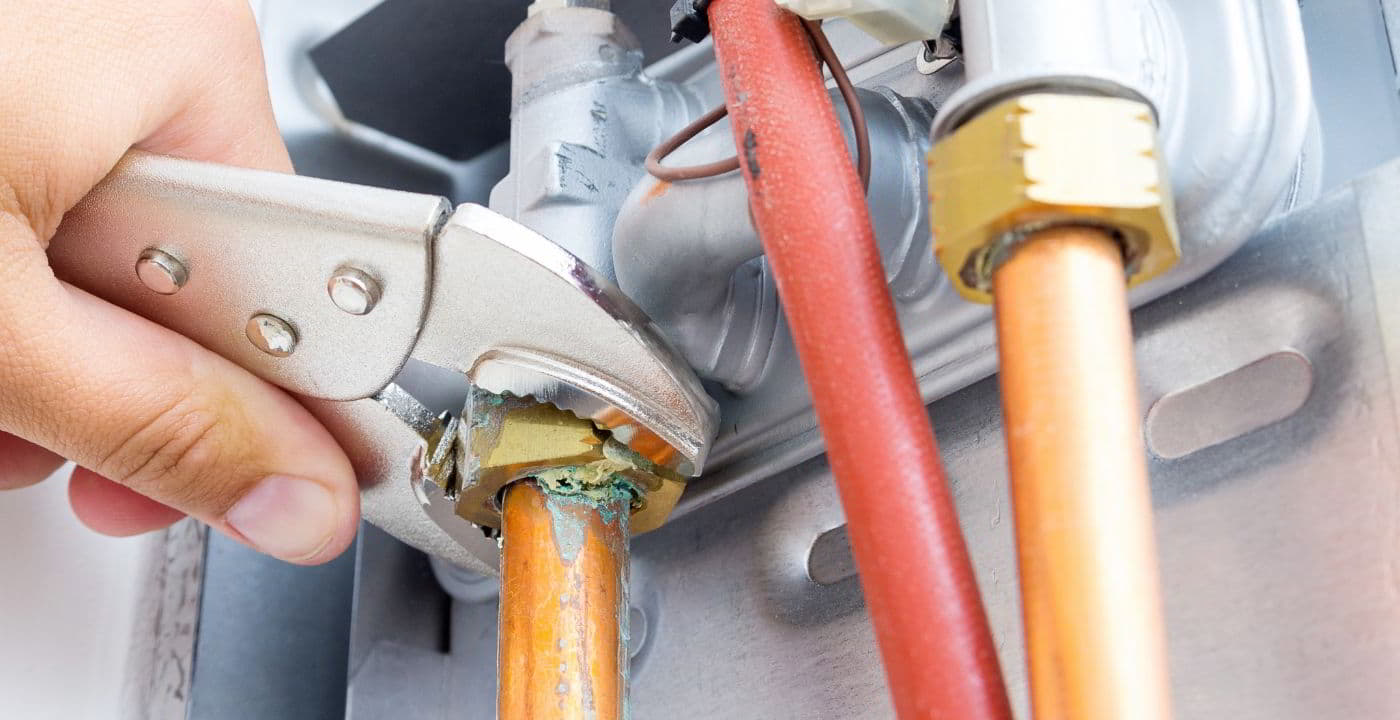
Coming at this from a different angle, now we’ll take a look at the most frequent causes of noisy boilers and how to deal with them or prevent them in the first place.
1. Internal Scale and Debris
The cause of kettling traces back to internal scale or debris build-up.
These restrict water flow, causing overheating and steam production, which then leads to the whistling sounds often misinterpreted as mere mechanical quirks.
Regular descaling and system flushes by a Gas Safe engineer can mitigate these issues.
2. Ignition System Degradation
The ignition system is the spark of life for a boiler. When it begins to fail, the boiler may make clicking sounds as it attempts to ignite.
This failure can stem from a variety of issues, from electrical faults to gas supply inconsistencies, and requires an expert’s touch for diagnosis and repair.
3. Pressure Imbalances and Pump Malfunctions
Central heating system complaints often originate from pressure imbalances or pump malfunctions.
High boiler pressure or incorrect pump settings can create a humming that reverberates through the home.
These issues are usually a sign that the system’s calibration needs professional adjustment.
4. Incorrect Pump Setting or Loose Parts
The rattle of a vibrating boiler often points to the need for a tightening of screws or the clearing of flue blockages.
It can also indicate a pump that’s been set incorrectly, causing juddering within its housing.
While a screwdriver might be all you need for loose parts, a Gas Safe engineer’s toolkit is required for the more intricate issues like flue obstructions or pump malfunctions.
6. Limescale Build-Up
The loud bangs that sometimes resonate from a boiler can frequently be traced to limescale accumulation within the heat exchanger.
This not only interferes with water heating but can lead to overheating and pressure build-up.
A power flush, Professional cleaning and water treatment can prevent this build-up.
7. Wear and Tear of Mechanical Parts
Lastly, general wear and tear of mechanical parts such as valves and pumps can manifest as rattling sounds.
Over time, components can loosen or degrade, requiring either adjustment or replacement.
This underscores the importance of routine inspections and maintenance to ensure the longevity of boiler components.
Frequently Asked Questions (FAQs)
When should I worry about boiler noises?
You should be concerned when noises are persistent, loud, or accompanied by other symptoms like leaks or failure to heat.
Always consult with a Gas Safe registered engineer for noises you can’t identify or fix yourself.
What does an airlock in a boiler sound like?
An airlock may produce a gurgling or bubbling noise as water attempts to flow through the obstructed area.
Stop The Whining, Things are Heating Up Again
Understanding your boiler’s language of noises can lead to early detection of issues, preventing costly repairs and ensuring your boiler operates efficiently. Regular maintenance and knowing when to call in the professionals are key to a healthy boiler system.
If you are looking to replace a faulty boiler, you can start identifying your perfect replacement now, and remember, each installation comes with a MagneCleanse system clean totally free of charge.
This blog was written in collaboration with Eddie Scoffin, the founder of Boiler Choice. Eddie has been installing boilers for over a decade. With a passion for excellence and customer satisfaction, Eddie’s leadership and expertise have been instrumental in the success of Boiler Choice. His commitment to making the boiler installation process hassle-free for customers has earned him a respected reputation in the industry.
Updated on November 14, 2023


